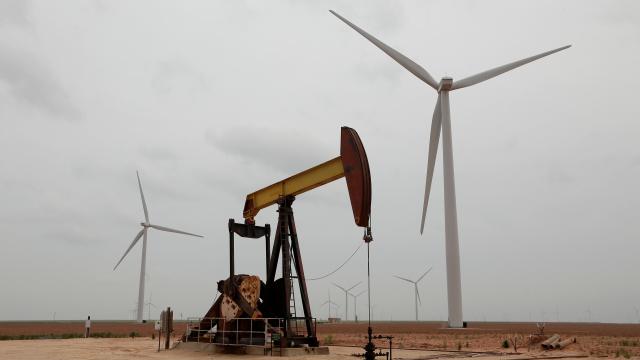The future of Texas’ troubled electric grid is being decided in the dark, with zero public input, by a group of people with deep connections to the fossil fuel industry. A panel of oil-and-gas-heavy experts appointed to create a plan to reform the Texas grid are refusing to make their draft recommendations public before they deliver them to the Legislature early next month.
At the second public meeting of the State Energy Plan Advisory Committee last week, the Committee’s 12 members narrowly voted to approve a draft set of recommendations to fix the Electric Reliability Council of Texas, or ERCOT. The Dallas Morning News reported that while the recommendations were read aloud to the audience, the panel refused to provide a draft copy to those in attendance.
“They simply would not distribute it,” Doug Lewin, an energy consultant who was in the audience at Wednesday’s meeting, told Earther. “It’s really kind of bizarre.”
A representative from the Lower Colorado River Authority, the public utility in charge of the committee process, confirmed to Earther in an email that neither the draft recommendations nor minutes from the public meeting would be made public before the final plan is delivered to the Legislature in September.
The Advisory Committee was formed as a result of Senate Bill 3, passed last year as part of a larger set of reforms to the state’s grid in the wake of the deadly 2021 winter storm that caused widespread power outages and killed hundreds. As laid out in the bill, the Committee is responsible for creating a “comprehensive state energy plan” to identify barriers to reliability, improve electric services, and evaluate pricing structures. This, according to Lewin, could have a wide range of outcomes. The Legislature could ignore the report; it could take some recommendations and turn them into bills; or it could pass the recommendations along to state agencies for implementation.
Governor Greg Abbott, Lt. Gov. Dan Patrick, and House Speaker Dade Phelan appointed the Committee’s 12 members. Those politicians are Republicans who have lied about climate science, targeted renewable energy, and/or advocated to the extreme for fossil fuels in the state (Patrick and Phelan, for instance, are jointly responsible for a law that punishes corporations that don’t want to do business with fossil fuels). Many of the appointees on the Committee have deep ties to fossil fuels, from employees of oil and gas companies like ConocoPhillips, Apache, Oncor, and Pioneer Natural Resources, to members of powerful electric utilities. One member sits on the board of the Texas Oil & Gas Association; another formerly served as a senior adviser to Rick Perry while he was the Secretary of Energy under President Trump.
The meeting last Wednesday was the last of two before the committee gives its final report to the Legislature on September 1. The recommendations barely passed in a 7-5 vote; as the Dallas Morning News reported, the final result gives outsize power to Lower Colorado River Authority CEO Phil Wilson, the committee’s chairman, to finalise the end product without other members’ input. Some of the committee members expressed discomfort with finalising the report after just two meetings when they believed there was more work to be done, according to the Dallas Morning News. Lewin told Earther that one of the committee members also voted against the recommendations because they were wary of voting on a final report without seeing the text of an introduction or other additions to the recommendations in advance. (Because the meeting’s minutes were not made public, we could not confirm Lewin’s report; the Lower Colorado River Authority did not answer that question in reply to our email.)
“Given the short time frame within which this committee is required to develop and finalise its recommendations, the general focus and conversation is on the issues we believe are most impactful on the reliability and stability and affordability of electric service in Texas,” Wilson told the Dallas Morning News.
As the Dallas Morning News reported, many of the recommendations seem to be very similar to reforms already being put in place by ERCOT in the wake of the storm. However, an additional measure was added during Wednesday’s meeting that calls for “intermittent” power sources — i.e., renewable energy — to have backup power sources. While widespread failures of multiple types of energy sources — including, most notably, natural gas — contributed to ERCOT’s outages during the storm, Texas Republicans have in year and a half since the storm made renewable energy, especially wind, a scapegoat. Language like what was added to the recommendations is similar to other attempts they have made in the past to try to cripple renewable energy. Mandating that wind and solar be paired with fossil-fuel heavy sources like gas could increase the price of setting up new sources of renewables, while also encouraging building more fossil fuel infrastructure — without solving the underlying issues plaguing the state’s gas plants.
Lewin explained that, while Texas state transparency laws are usually “quite good,” the Committee is not being run by a state agency, so there are “grey areas” in what they have to share with the public.
“I don’t know exactly what [transparency laws] they’re subject to, or not subject to. But at a minimum they should provide a copy [of the draft] — don’t they want people to see it?” he said. “It’s a shame they chose to go about it this way, but it’s not surprising from Texas.”
